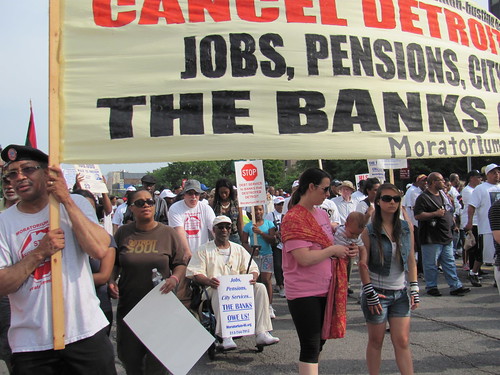
Tens of thousands marched down Woodward ave. on June 22, 2013 in commemoration of the 50th anniversary of the Detroit Walk to Freedom. This banner was carried by Moratorium NOW! Coalition. (Photo: Abayomi Azikiwe), a photo by Pan-African News Wire File Photos on Flickr.
October 3, 2013 at 1:00 am
Detroit bankruptcy weighs down banks around the world
David Shepardson
Detroit News Washington Bureau
Washington— The list of creditors in Detroit’s historic bankruptcy filing includes a number of European financial institutions that stand to lose millions, according to reports and banking documents examined by The Detroit News.
European banks are facing hundreds of millions of dollars in potential losses from purchases of Detroit debt as a result of the city’s Chapter 9 filing in July. Several struggling foreign banks that were seized by their government regulators during the 2008 European financial crisis had Detroit debt among the bad assets on their balance sheets.
Those losses and the city’s bankruptcy filing — coupled with the financial rules imposed on foreign major banks in the wake of Europe’s financial woes — mean banks today wouldn’t be likely to buy as much Detroit debt as in years past, said Robert Brooks, professor of financial risk management at the University of Alabama.
“The ability of a bank to take a huge speculative position on a single municipality is not going to happen,” Brooks said. “It’s going to be flagged by regulators.”
Many European banks saw U.S. municipal debt as essentially risk-free — and, in fact, in many recent municipal bankruptcies, cities have repaid all or most of their general obligation debt. With recent developments, however, foreign bankers are less likely to look at taking on Detroit loans.
Foreign banks touched by the Detroit fallout include French-Belgian bank Dexia SA, Commerzbank in Germany, Swiss-based UBS AG, and EEPK of Luxembourg.
Dexia SA said in a filing it has $305 million in total exposure to Detroit debt. The bank said $75 million is covered by insurance, while the rest is insured by a company also under restructuring. The bank said it would takean $80 million charge against earnings because of its Detroit debt exposure.
Dexia has another $148 million of additional exposure to Detroit debt that is not being restructured in the city’s bankruptcy.
The bank has been kept afloat by billions in bailouts from France, Belgium and Luxembourg.
Commerzbank said last month that exposure to Detroit debt had hurt second-quarter earnings, but has not disclosed by how much. Reuters reported the bank’s affiliates may have loaned Detroit as much as $400 million.
A government agency in Germany, FMS Wertmanagement, is selling off the assets of another bank that bought Detroit debt.
In that case, the government-owned Hypo Real Estate Holding AG holds Detroit debt with a face value of $200 million, said Andreas Henry, a spokesman for FMS Wertmanagement. The debt was acquired by Irish bank Depfa Bank PLC, which was later purchased by Hypo. Hypo was seized by the German government during the financial crisis.
Before the financial crisis, European banks didn’t face the same rules as U.S. banks in requiring significant capital be set aside to guard against losses in investments that were perceived safe, such as U.S. municipal bonds.
Peter Henning, a Wayne State University professor and former Securities and Exchange Commission attorney who writes on financial issues, said foreign banks “interpreted the city debt as sovereign debt — to mean it will never default.”
“In fairness to them, this isn’t Argentina. They were more trusting,” Henning said. “The big question is whether Detroit is an outlier or a harbinger of future losses for the banks.”
Brooks, the University of Alabama professor, said even if banks spread out risk, it doesn’t necessarily mean fewer bad loans will get made in the future.
“How do European banks know how to assess the risk of Detroit debt?” Brooks asked, arguing that banks closer to the city might have a better handle on the risks. “I would not be surprised if banks are much more cautious (now). ... There is enormous amount of effort to study risk concentration.”
No major city has filed for bankruptcy since Detroit, and some analysts have suggested some financially troubled cities are waiting to see how the city fares in Chapter 9 bankruptcy restructuring before deciding whether to follow suit.
The biggest deal involving Detroit and foreign banks was Swiss-based UBS AG, which led a group of banks that sold Detroit $1.4 billion in certificates of participation to fund the city’s two pension plans in 2005 and 2006. Detroit Emergency Manager Kevyn Orr has said without a deal to terminate that arrangement more than $45 million will be owed each year for the next 10 years for debt.
The city offered as collateral the taxes it collects from the city’s casinos to avoid paying more than $300 million to UBS and another firm. Detroit had purchased interest rate “swaps” that set fixed interest rates on the pension debt. The banks have agreed to a payment of about 75-80 cents on the dollar to cancel the swaps arrangement. Detroit has said without the deal, it’s access to casino tax revenue could be in jeopardy.
The current value of the swaps is $343 million — and a deal could mean the city would save nearly $100 million on what it owes in those deals. Without a deal, Detroit would be forced to pay as much as $1.1 billion to meet its obligations — because the city agreed to interest rates that were far higher than actual interest rates in recent years.
Another Luxembourg bank, EEPK, took part in the certificates of participation. It holds notes worth $152.5 million, according to a bankruptcy filing.
dshepardson@detroitnews.com
(202) 662-8735
From The Detroit News: http://www.detroitnews.com/article/20131003/METRO01/310030045#ixzz2gfAqSNhR
No comments:
Post a Comment